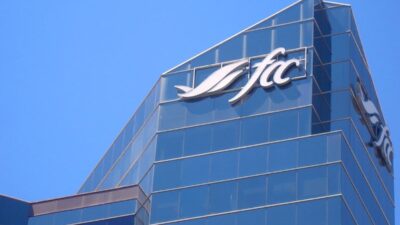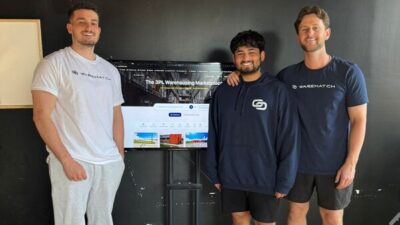What happens when a quality management expert sees a gap in the market and decides to fill it himself? Meet Oluwole, the founder of ‘Shipped by Wole’, a platform that connects Nigerian communities in Canada with food and shipping services they need.
Oluwole’s story starts in corporate consulting, where he worked in digital transformation and regulatory compliance. But it was his experience in the food industry that opened his eyes to a bigger opportunity. He noticed that many ingredients used in Canadian food production had to be imported from places like West Africa – but the process was inefficient and expensive.
Now, just over a year since launching his platform, Oluwole is building something bigger than just a shipping service. He’s creating a bridge between Nigeria and Canada that serves diaspora communities while adding real value to both countries.
In this interview, he shares how he made the jump from consultant to entrepreneur, the challenges of building a logistics business from scratch, and his plans to use technology to better serve underserved communities.
Can you walk us through your career journey and how you transitioned into digital transformation and entrepreneurship?
Oluwole: One of the early realizations in my career was the industry’s urgent need to digitally transform.
Operational gains were necessary for cost savings, and these digital transformations came with enterprise solutions. As they applied to the work I was doing in quality management, there was a need for quality management systems, which are a digitized version of what would otherwise be done manually, manual verifications, manual inspections, and so on.
I helped digitize these processes and set up digital tracking systems that eliminated human error and kept every process consistent. AQIP implementation gave me my first real taste of this work. After that, I moved into regulatory compliance consulting and started working with multiple food industry companies who sought out my expertise.
All of this experience also made me realize the need for ingredients in the food industry. Remember, I worked in operations and quality management, so I saw that a lot of what was being produced in Canada was made using precursor materials that couldn’t be sourced locally. Many of these needed to be imported—either from West Africa, Brazil, or the United States. But a large portion was being sourced, or could be sourced, from West Africa. That was a light bulb moment for me.
Our vision became about generating value—not just harvesting raw materials and dumping resources, but actually generating value within Nigeria, engaging the Nigerian workforce, and exporting that value to Western industries.
So the parallels between my vision in digital transformation and my vision as an entrepreneur began to form around 2020. My entrepreneurial spirit was already growing as a consultant, because I had multiple clients and was handling stakeholder management, client communications, etc. There were KPIs set for me to grow the consulting business I worked for, and through that, I developed a lot of capacity.
Long story short, my exposure to digital transformation eventually took me into the pharmaceutical and biopharma space, which is where I am today.
I know that’s a long-winded response, but I hope I answered it well.
Q: So when did you launch the platform? What’s been driving it? Canada has a lot of resources for Black founders — from programs to accelerators. Are you part of any of these, and how are they supporting your product growth?
Oluwole: Yeah, that’s a great question. Recently, we were accepted into an accelerator program called YEDI — which stands for York Entrepreneurship Development Institute. It’s actually more of an incubator that helps prepare businesses for venture investment.
YEDI supports ventures with an innovative edge and connects them to investors within its network. What’s interesting is that they also have their own venture fund, which helps further develop the businesses they incubate. So aside from potential funding, YEDI also offers infrastructure — which is something Shipped by Wole really needs as we grow.
We haven’t accessed the Black Entrepreneurship Investment Fund yet. Shipped by Wole is just over a year old, and we’re still learning and working on refining the business structure. Once we’ve built a stronger foundation, we’ll be in a better position to tap into the additional resources platforms like that can offer.
Q: What’s your current ARR, and what are your plans for the next two years?
Oluwole: Right now, our annual recurring revenue (ARR) is somewhere between $50,000 and $100,000 Canadian dollars. I know that’s a pretty wide range, but it reflects the early stages of the business, which came with a lot of inefficiencies — both on the Nigerian side and here in Canada.
To be honest, I didn’t have a background in logistics when I started, so there was a steep learning curve. But over time, things have gradually improved, especially around recruitment and how we structure the business. We’ve made a lot of progress, and that’s setting the stage for more focused growth over the next couple of years.
Q: With programs like the accelerator you’ve joined, are you able to run other initiatives while still building your business?
Oluwole: I found out about YEDI accelerator program at a networking event a friend invited me to. That’s where I met the founders of the YEDI platform for the first time. During our conversation, I shared my professional background and mentioned that I was also pursuing an Executive MBA at the Kellogg School of Management.
They were very encouraging and supportive of that. I also introduced them to my business, explained some of the investment opportunities, and highlighted the kind of support we’d need to scale effectively. That initial meeting really sparked their interest — they were genuinely enthusiastic about learning more and figuring out how they could help.
Q: In a crowded logistics and shipping market, how does ‘Shipped by Wole’ differentiate itself from established players and other emerging solutions?
Oluwole: Right now, we’re still evolving, but one area where Shipped by Wole is starting to stand out is digitization — specifically, end-to-end digital integration. What I mean by that is streamlining our business processes so that customers, particularly in Nigeria or across West Africa, can trigger deliveries directly from their phones.
Instead of having to call us or use WhatsApp — which can be time-consuming on both sides — customers should be able to pick up their phone, tap a few buttons, and get things moving. We’re working to embed technology that can, for example, use your phone’s camera to help estimate package size and cost. The infrastructure is already identified, and we’re now working on implementation.
Another differentiator is that there are two sides to the business — the logistics side and a manufacturing component. On the manufacturing side, we focus on high-demand food items relevant to both Nigerian consumers and the broader Canadian market. We process and package these products and then warehouse them for bulk distribution and export.
So, while we’re still early in our journey, our vision is clear: to fully embrace technology and deliver a more efficient, convenient, and scalable experience for our customers — both now and in the future.
Q: I noticed from your profile that you work with AI and IoT technologies. What role do you see analytics and automation playing in improving operational efficiency, cost savings, and customer experience in your product?
Oluwole: That’s a great question. Over the past year, beyond just streamlining our business processes, I’ve been focused on how digital technology can help us improve service delivery — especially in high-demand areas across Canada.
One of the major pain points in regions like Ontario is that many Nigerians live in remote or suburban areas, where affordability drives them further from city centers. These communities often lack access to services that cater to their needs, like access to Nigerian food items or affordable shipping options to send things back home.
We’re planning to set up satellite collection points — essentially local hubs — where customers can drop off or receive packages more easily. By leveraging technology and automation, we can make pick-up and delivery far more convenient, directly from their phones. It will also allow us to aggregate last-mile delivery services from companies like DHL, Canpar, and Canada Post, helping us negotiate discounted rates for our customers.
This matters because, right now, a lot of the pricing in the shipping space is predatory — especially for people in less connected communities. With predictive analytics, we’ll be able to identify high-demand areas in advance, saving both our business and customers time and money.
Ultimately, this approach will help us redirect resources into other critical parts of the business — like manufacturing — while also improving reach, especially to underserved, remote communities. My background in AI, data systems, and automation will help power all of this, making operations smoother for us and the experience easier for our customers.
Q: Do you feel like you’re the right person to build this product?
Oluwole: I wouldn’t say I’m the only right person to build this product — because honestly, it takes a village. Building a product like this requires a mix of skill sets and varying levels of technical exposure, and no single person can do it all.
That said, I do believe I’m the right person to lead the vision. I’ve had exposure to multiple industries and business processes, which gives me a broader understanding of what’s needed to make this work. More importantly, I’m part of the Nigerian community, so I understand the pain points on a personal level. That gives me a unique insight into the customer — what they value, what frustrates them, and what will truly make their lives easier.
I play a pivotal role in recognizing those needs and shaping the roadmap to meet them. One major issue I haven’t even mentioned yet is around ingredient benchmarks. Many Nigerian food products imported today don’t go through proper compliance checks. The testing processes are often skipped, which poses serious health and regulatory concerns. That’s another gap we’re addressing — ensuring our products meet proper standards, not just for convenience, but for safety and trust as well.
Wrapping Up
Oluwole’s journey with ‘Shipped by Wole’ shows what’s possible when you combine industry experience with a deep understanding of community needs. He’s not just moving packages – he’s solving real problems for Nigerian families living across Canada, from big cities to remote areas.
What makes his approach different is the focus on doing things right. From ensuring food safety standards to using technology to make shipping more affordable, Oluwole is building a business that puts community needs first. His plans for satellite collection points and AI-powered logistics show he’s thinking long-term about how to better serve customers.
His journey from corporate consultant to entrepreneur shows that sometimes the best business ideas come from simply paying attention to the problems around you – and having the courage to solve them.





